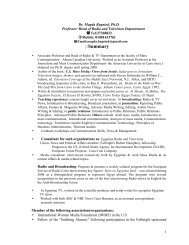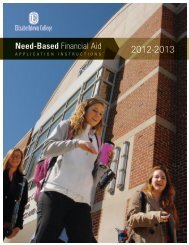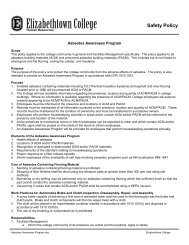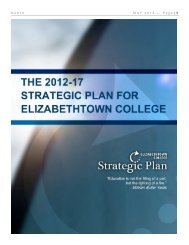Policy Against Discrimination, Harassment, and Bullying In keeping ...
Policy Against Discrimination, Harassment, and Bullying In keeping ...
Policy Against Discrimination, Harassment, and Bullying In keeping ...
Create successful ePaper yourself
Turn your PDF publications into a flip-book with our unique Google optimized e-Paper software.
<strong>Policy</strong> <strong>Against</strong> <strong>Discrimination</strong>, <strong>Harassment</strong>, <strong>and</strong> <strong>Bullying</strong><br />
<strong>In</strong> <strong>keeping</strong> with the historical values of Elizabethtown College, the College endeavors to treat all<br />
employees with dignity, justice, <strong>and</strong> fairness.<br />
Elizabethtown College does not tolerate discrimination or harassment of any kind, or bullying against any<br />
member of the Elizabethtown College community. The College is committed to the existence of a<br />
respectful, safe, <strong>and</strong> healthy work <strong>and</strong> learning environment <strong>and</strong> will ensure that federal <strong>and</strong> state laws,<br />
as well as College regulations prohibiting violence <strong>and</strong> discrimination, are fully enforced.<br />
This policy is to be implemented throughout the College <strong>and</strong> is the responsibility of all departments <strong>and</strong><br />
personnel, supervisory <strong>and</strong> nonsupervisory. Failure to abide by this policy shall result in disciplinary<br />
action, up to <strong>and</strong> including immediate termination of employment. Further, threatening, violent,<br />
discriminatory, or harassing conduct is subject to expulsion from the College or possible civil or criminal<br />
prosecution.<br />
Any employee or student of the College who believes he/she is being subjected to conduct that violates<br />
this policy, including any discrimination, harassment (sexual or other discriminatory harassment) or<br />
bullying is encouraged to report the situation in accordance with the reporting procedures set forth below.<br />
<strong>Discrimination</strong><br />
Elizabethtown College does not discriminate on the basis of gender, race, color, religion, age, disability,<br />
veteran status, national or ethnic origin, ancestry, sexual orientation, gender identity <strong>and</strong> expression,<br />
genetic information or any other characteristic protected by the applicable federal, state <strong>and</strong> local laws.<br />
<strong>Discrimination</strong> or harassment of any kind is strictly forbidden.<br />
<strong>Harassment</strong><br />
The College defines harassment as any behavior, verbal or physical, which creates an intimidating,<br />
hostile or offensive work, learning, or living environment, particularly if questionable behavior is repeated<br />
<strong>and</strong>/or if it continues after the offending party is informed of the objectionable <strong>and</strong>/or inappropriate nature<br />
of the behavior, <strong>and</strong> which is based on individual characteristics including gender, race, color, religion,<br />
age, disability, veteran status, national or ethnic origin, ancestry, sexual orientation, gender identity <strong>and</strong><br />
expression or any other legally protected status.<br />
Definitions:<br />
Examples of the most common types of harassment include but are not limited to:<br />
<br />
<br />
<br />
<br />
Verbal harassment, such as jokes, epithets, slurs, negative stereotyping, <strong>and</strong> unwelcome or<br />
patronizing remarks about an individual’s body, color, physical characteristics, or appearance.<br />
Physical harassment, such as physical interference with normal work, impeding or blocking<br />
movements, assault, unwelcome physical contact, staring at a person’s body, or threatening,<br />
intimidating, or hostile acts that relate to a protected characteristic.<br />
Visual harassment, such as offensive or obscene photographs, calendars, posters, e-mails,<br />
cards, cartoons, drawings <strong>and</strong> gestures, display of lewd objects, unwelcome notes or letters, or<br />
any written, electronic, or graphic material that denigrates or shows hostility or aversion toward an<br />
individual.<br />
Sexual harassment, which is specifically defined as sexual advances, requests for sexual<br />
favors, <strong>and</strong> other verbal or physical conduct of a sexual nature or conduct directed toward<br />
another person because of his/her gender where:<br />
o Submission to such conduct is made -- either implicitly or explicitly -- a term or condition<br />
of a person’s academic or employment status;<br />
o Such behavior has the purpose or effect of substantially interfering with the individual’s<br />
academic or work performance or creating an intimidating, hostile or offensive classroom<br />
or working or academic environment; or<br />
o Submission to or rejection of such conduct by an individual is used as a basis for<br />
decisions affecting the individual.
Sexual violence, including physical sexual acts perpetrated against a person’s will or where a<br />
person is incapable of giving consent due to the victim’s use of drugs or alcohol or due to an<br />
intellectual or other disability.<br />
Gender-based harassment, which may include acts of verbal, nonverbal, or physical<br />
aggression, intimidation, or hostility based on sex or sex stereotyping, even if these acts do not<br />
involve conduct of a sexual nature.<br />
<strong>Bullying</strong><br />
The College is committed to the elimination of all forms of bullying <strong>and</strong> will ensure that procedures exist to<br />
allow complaints of bullying to be dealt with <strong>and</strong> resolved without limiting any person’s entitlement to<br />
pursue resolution of their complaint within the relevant statutory authority.<br />
Definitions:<br />
<strong>Bullying</strong> is unwelcome or unreasonable behavior that demeans, intimidates, or humiliates people either as<br />
individuals or as a group. <strong>Bullying</strong> behavior is often persistent <strong>and</strong> part of a pattern, but it can also occur<br />
as a single incident. It is usually carried out by an individual but can also be an aspect of group behavior.<br />
Context is important in underst<strong>and</strong>ing bullying, particularly verbal communication. There is a difference<br />
between friendly banter exchanged by colleagues <strong>and</strong> comments that are meant to be, or are taken as,<br />
demeaning.<br />
Mobbing is a particular type of bullying behavior carried out by a group rather than by an individual.<br />
Mobbing is the bullying or social isolation of a person through collective unjustified accusations,<br />
humiliation, general harassment, or emotional abuse. Although it is group behavior, specific incidents<br />
such as an insult or a practical joke may be carried out by an individual as part of mobbing behavior.<br />
<strong>Bullying</strong> is unacceptable behavior because it breaches principles of equality <strong>and</strong> fairness, <strong>and</strong> it<br />
frequently represents an abuse of power <strong>and</strong> authority. It also has potential consequences for everyone<br />
involved.<br />
Reporting Procedures for <strong>Discrimination</strong>, <strong>Harassment</strong>, <strong>and</strong> <strong>Bullying</strong><br />
Any employee who believes he/she is being subjected to discrimination, harassment (sexual or other<br />
discriminatory harassment) or bullying shall report the situation to his/her supervisor or the Associate Vice<br />
President for Human Resources. A complaint should be made in writing whenever possible, including as<br />
much information as possible, such as details of the alleged incident, dates, names of those involved in<br />
the harassment, any physical evidence that may exist, <strong>and</strong> the names of any individuals who may have<br />
observed or witnessed the conduct.<br />
Any employee who witnesses, receives a complaint, or otherwise learns of conduct that is in violation of<br />
the policies related to discrimination, harassment, or bullying is required to refer the matter to his/her<br />
supervisor or the Associate Vice President for Human Resources. Any incident or complaint involving a<br />
student should be reported to the Dean of Students.<br />
The College will act promptly <strong>and</strong> appropriately upon any information that it obtains which indicates that<br />
any violation of this policy has taken place. Prompt <strong>and</strong> appropriate action will be taken pending an<br />
investigation to ensure that any prohibited conduct that might exist does not continue.<br />
<strong>In</strong>formal Resolution<br />
It may be possible <strong>and</strong> appropriate to resolve the reported offense informally. The supervisor, in<br />
consultation with the Associate Vice President for Human Resources will document the complaint <strong>and</strong><br />
informal steps taken to resolve the concern. Documentation falling under the <strong>In</strong>formal Resolution process<br />
will remain in a separate file in the Associate Vice President for Human Resources office <strong>and</strong> not placed<br />
in the respondent’s personnel file. This information will be used to monitor repeated complaints within the<br />
same department or involving the same individual. Should additional complaints be received, the
Associate Vice President for Human Resources will move the complaint <strong>and</strong> documentation to the Formal<br />
Resolution process.<br />
Formal Resolution<br />
If, for any reason, the matter cannot be resolved as described above, or a complainant chooses the<br />
formal resolution, the complainant will state the specific allegations in writing so that an investigation can<br />
be initiated by the Associate Vice President for Human Resources or assigned neutral designee. The<br />
Associate Vice President for Human Resources or assigned neutral designee will then promptly<br />
coordinate a complete investigation into the complaint.<br />
The Associate Vice President for Human Resources or assigned neutral designee will decide whether the<br />
complaint warrants:<br />
a. Further investigation by the College or, if criminal behavior has been discovered, by law enforcement.<br />
b. Dismissal of the charges if unsubstantiated with communication of the outcome to the accused <strong>and</strong> the<br />
complainant as well as a letter in the accused’s file regarding the outcome of the investigation.<br />
c. Affirmation of the allegations with recommendations for appropriate disciplinary action. Notification<br />
verbally <strong>and</strong> in writing to the employee as to the findings of the investigation <strong>and</strong> applicable sanctions as<br />
determined by the Senior Staff officer for that area in consultation with the Associate Vice President for<br />
Human Resources. A letter outlining the offenses <strong>and</strong> actions taken will be placed in the employee’s<br />
personnel file.<br />
Recommended disciplinary action will be determined on a case-by-case basis <strong>and</strong> will be determined by<br />
the frequency <strong>and</strong> severity of the violation.<br />
Should either the complainant or the employee disagree with the outcome of the investigation, an ad hoc<br />
Peer Relations Review Committee of three employees chosen by the Dean of Faculty (concerning faculty<br />
complaints) or the Provost/Senior Vice President <strong>and</strong> Vice President for Administration (concerning staff<br />
<strong>and</strong> administration complaints) will be established. The Peer Relations Review Committee will conduct an<br />
independent investigation <strong>and</strong> make a recommendation as to the results of the Committee’s investigation.<br />
The Dean of Faculty, Provost/Senior Vice President, <strong>and</strong> the Vice President for Administration, as<br />
appropriate to the case, will then make a final determination <strong>and</strong> action<br />
.<br />
An employee found to have violated the College’s policies against discrimination, harassment, <strong>and</strong><br />
bullying may be subject to disciplinary action up to <strong>and</strong> including termination or release.<br />
Retaliation<br />
The College will not retaliate, nor will it tolerate retaliation, against any employee or student who, in good<br />
faith, reports or makes a complaint of discrimination, harassment, or bullying in the workplace or<br />
classroom, or who participates in an investigation into the same. Following the resolution of any<br />
complaint, the employee or student should continue to keep the College informed if the harassment<br />
persists.<br />
No individual will be subject to disciplinary action for submitting a good faith report of a policy violation.<br />
However, any claims of prohibited conduct that are found to be deliberately false will be investigated <strong>and</strong><br />
the complainant may be subject to disciplinary action. Anyone who believes that she/he has been the<br />
subject of a false allegation may meet with his/her supervisor or the Associate Vice President for Human<br />
Resources to discuss the allegations.<br />
Confidentiality<br />
The College shall maintain confidentiality to the extent possible within the requirements of conducting<br />
reasonable <strong>and</strong> complete investigations. To the extent possible, only those who have a need to know will<br />
be told the identity of the parties to a complaint. <strong>In</strong> certain circumstances, however, the investigation may<br />
disclose the identity of those individuals who claim to have been harassed <strong>and</strong>/or others involved.
<strong>In</strong> some instances, a reporting party may ask to take no action or to defer action until a later date in order<br />
to maintain anonymity. <strong>In</strong> these instances, the College reserves the right to limited disclosure <strong>and</strong> to take<br />
appropriate action in order to complete its investigation <strong>and</strong> to ensure the safety <strong>and</strong> well-being of other<br />
members of the College community.<br />
The College as Complainant<br />
The College reserves the right to investigate allegations of prohibited conduct in appropriate<br />
circumstances even in the absence of a complaint from a member of the College community. Results of<br />
any investigation involving prohibited conduct will be documented <strong>and</strong> coordinated through Human<br />
Resources <strong>and</strong> in cases involving students the Office of Student Rights <strong>and</strong> Responsibilities.









